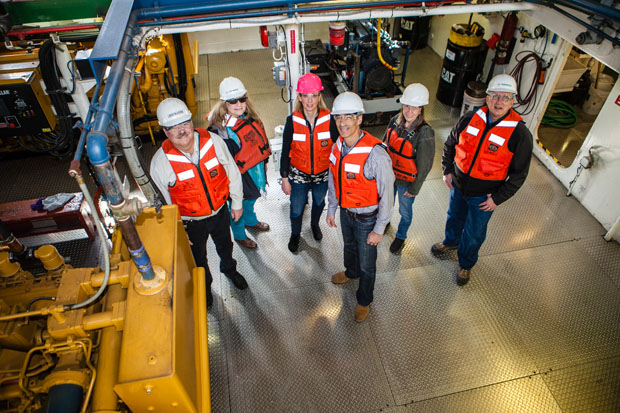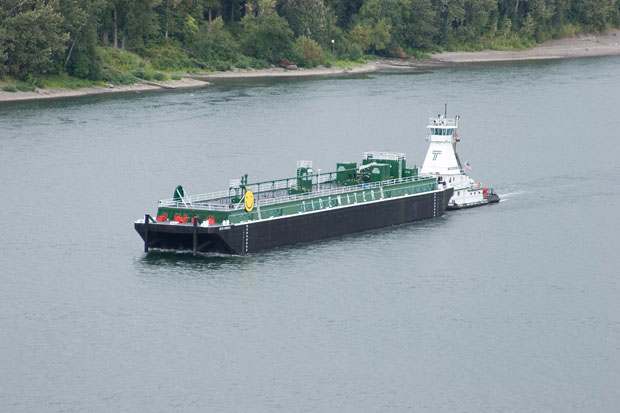BY SOPHIA BENNETT
Since 1932 Tidewater Transportation & Terminals (operating as Tidewater Barge Lines and Tidewater Terminal Company) has operated a multicommodity transportation and terminal company based in Vancouver, Washington. The friendly expression on the company’s shipping containers reflects the attitude of about 330 safety and community-conscious employees but belies how complicated the barge business really is.
BY SOPHIA BENNETT

Bill Collins (far right) and the rest of the environmental health, safety and security compliance team play a big role in protecting environmental resources and worker safety.
It’s a common sight on the Columbia and Snake rivers: barges with smiley faces carrying grain, petroleum and other products between ports in Lewiston, Idaho, and Astoria, Oregon.
Since 1932 Tidewater Transportation & Terminals (operating as Tidewater Barge Lines and Tidewater Terminal Company) has operated a multicommodity transportation and terminal company based in Vancouver, Washington. The friendly expression on the company’s shipping containers reflects the attitude of about 330 safety and community-conscious employees but belies how complicated the barge business really is.
“You really can’t afford to have a mistake in any area,” says attorney Jeanette Schuster, who works closely with Tidewater. “There’s a multifaceted system of guidelines and governance that must be navigated in order to get some grain or petroleum moved.”
Schuster is a partner at the Portland-based law firm Tonkon Torp, and is a member of its Environmental and Natural Resources Practice Group. She and her colleagues assist a six-member team at Tidewater that is focused on environmental, health, safety and security (EHS&S) compliance. The team is led by Bill Collins, who shoulders a big job given the multitude of laws and regulations governing the company.
“We want no injuries and no spills,” Collins says. “We want 100% compliance, no equipment and property damage, and no commodity damage.”
To ensure Tidewater meets these lofty yet imperative goals, Collins rattles off a staggering list of principal components that keep him, his group and others busy at Tidewater: updating hundreds of written policies and procedures, maintaining a global EHS&S management system, running an audit program, tracking every safety hiccup to determine its root causes and take corrective actions, reporting to roughly 25 regulatory agencies, including the U.S. Coast Guard, Occupational Safety and Health Administration, Environmental Protection Agency, Washington Department of Ecology, and Oregon Department of Environmental Quality.
Although it may be unusual for a company of this size to have a full-time safety and environmental services team, Tidewater would not have it any other way. Their commitment to safety necessitates an internal EHS&S team — one that can do double duty: handle government-mandated paperwork and continually look for ways to improve the company’s processes.

One of Tidewater’s tugs on the Columbia River.
Tidewater, however, still relies heavily on a team of experts they view as partners — members of Tonkon Torp’s Environmental and Natural Resources Practice Group, which is chaired by Max Miller, and include a former Environmental Protection Agency litigator and a water law expert. They can jump in when needed to offer opinions on complicated legal issues or complex regulatory requirements.
In addition to Tonkon Torp’s expertise, Collins explains that regulatory agencies are also one of the company’s best resources. “They help us improve, and we consider them partners too. Our relationships with the regulators and Tonkon Torp allows us to improve and reduce risk. It’s been a good experience.”
Investing in EHS&S has paid off. In the past 30 years, Tidewater has safely moved volumes of petroleum products necessary to meet demands in the Tri-Cities and Spokane markets and millions of tons of grain on the Columbia-Snake River system while continuing to be a steward of the environment. No wonder the faces on their barges are smiling.

